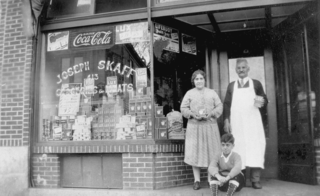
The flow of immigrants from modern day Lebanon and Syria to West Virginia began in the 1880s and peaked in the 1920s. They came as refugees from increasingly rigid Ottoman rule, which after centuries of relative acceptance had grown hostile to Arab Christian enclaves and their special economic and cultural relationships with the empire’s rivals of France and Great Britain. They settled principally in the cities, especially Charleston, Wheeling, Huntington, and Parkersburg.
Lebanese and Syrians almost never worked on West Virginia’s farms or in the mines and factories. They single-mindedly continued their mercantile traditions, which date to Biblical times, and assumed a leading role in state commerce. Pack peddlers, both men and women, carried notions, fabrics, apparel, and household goods on foot throughout the remote, developing mineral lands of West Virginia. As they prospered, Lebanese and Syrian merchant families helped introduce retail competition into regions previously monopolized by coal and timber company stores. By the 1930s, key towns included Lebanese and Syrian-owned clothing, hardware, and department stores. In the cities, where general merchandisers already were well established, Lebanese and Syrian families tended to own fruit stands and green groceries.
Fred Haddad of Madison founded the discount department store chain, Heck’s, Inc., a national pioneer in volume purchasing, distribution, and merchandising and the first West Virginia-based corporation listed on the New York Stock Exchange. Other retailers of humble origins grew into multi-store chains such as Gabriel Brothers, Ammar Brothers, and Aide’s.
As soon as they were able, the Lebanese and Syrians established religious communities in West Virginia’s largest cities. Adherents of Orthodoxy, governed by the Patriarch of Antioch, Turkey, constitute the largest denomination represented in West Virginia, with parishes in Charleston, Beckley, and Huntington. In 1905, St. George Orthodox Church of Charleston was established and became one of the largest Antiochene parishes in the United States. The church’s iconostasis—a large screen of icons depicting the apostles of the early church—is considered one of the most significant works of religious art in West Virginia. In 2000, the liturgies at St. George still were chanted largely in Arabic.
Founded in 1906, Our Lady of Lebanon Church in Wheeling is home to Maronites, Eastern Rite Catholics who accept the leadership of the Roman Catholic pope. Our Lady of Lebanon Church, one of the oldest Maronite parishes in the United States, was the scene of an alleged miracle when a life-sized icon of Mary depicted as Our Lady of Lebanon survived an all-consuming fire. The icon hangs inside the rebuilt church.
In addition to Orthodox and Maronites, a small group of Syrian Melkites, also Eastern Rite Catholics, settled in Parkersburg. Representatives of the Druse, an Islamic sect, settled in Charleston, Princeton, and Bluefield. After World War II, as the flow of Christian Lebanese and Syrians to West Virginia slowed to a trickle, the majority of the Arab influx to the state was Muslim. In the 1980s, Syrian Muslims helped found the Islamic Center of West Virginia.
The cultural life of the Lebanese and Syrians, perhaps because of its exoticism, remains guarded and little known to most West Virginians, with a few exceptions. Each August, Wheeling is host to the Mahrajan, a homecoming for Lebanese families from that area. Each fall, St. George Orthodox Church holds a popular dinner in which food of the homeland is served.
Nick Joe Rahall of Beckley is one of a few people of Lebanese descent who has served in the United States House of Representatives. Rahall, a Democrat, served in the Third Congressional District of West Virginia from 1977 to 2015.
This Article was written by Mark A. Sadd
Last Revised on July 20, 2023
Related Articles
Cite This Article
Sadd, Mark A. "Lebanese and Syrians." e-WV: The West Virginia Encyclopedia. 20 July 2023. Web. 26 July 2024.


Comments?
There aren't any comments for this article yet.
Click here to read and contribute to the discussion →